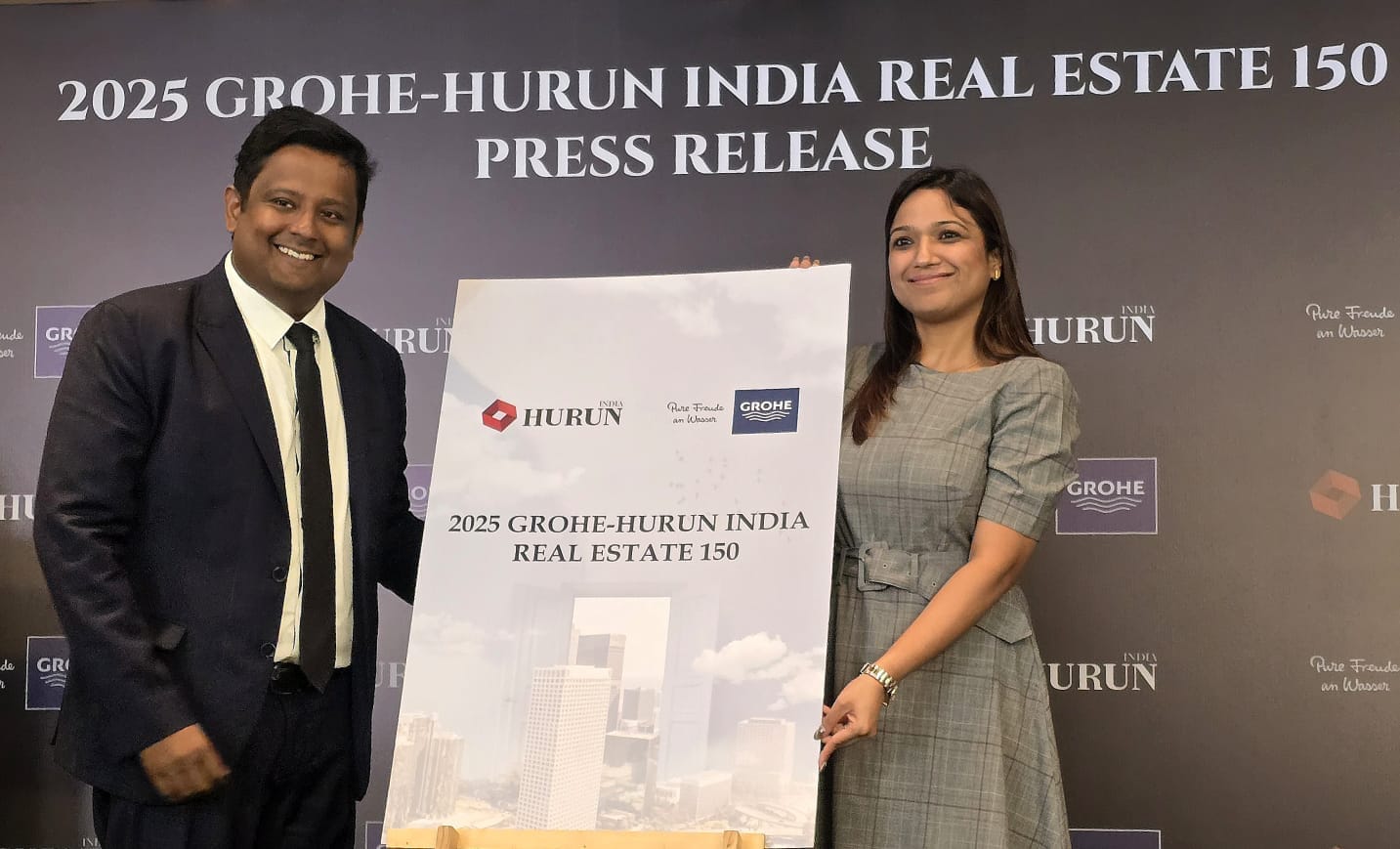India’s most influential names in real estate came into sharp focus today as GROHE and Hurun India unveiled the much-anticipated 2025 GROHE-HURUN India Real Estate 150 in Mumbai. Alongside the ranking of the country’s most valuable real estate companies, the event also revealed the GROHE-HURUN India Real Estate Rich List, which maps the wealth of the industry’s top entrepreneurs.
Leading this year’s rich list is Rajiv Singh of DLF, with a real estate wealth of ₹1.27 lakh crore, followed by Mangal Prabhat Lodha and family of Lodha Developers at ₹92,340 crore. In third place is Gautam Adani and the family of Adani Realty, with a wealth of ₹52,320 crore. Their dominance reflects not just the scale of their companies, but also their continued influence in shaping the future of India’s urban growth.
The corporate rankings mirror these personal achievements. DLF maintains its place as India’s most valuable real estate company, with Lodha Developers and Indian Hotels Company (Taj Group) taking the second and third positions respectively. The inclusion of Indian Hotels at the top underscores how hospitality has grown into a powerful vertical within the real estate sector.
A standout highlight from this year’s unveiling was the debut of OYO, the hospitality-tech disruptor led by Ritesh Agarwal, which entered directly into the Top 15. This bold entry reflects the broader shift in India’s real estate scene, where co-living spaces, tech-enabled stays, and flexible formats are rapidly gaining prominence alongside conventional property models.
Regional Powerhouses & Emerging Players
The 2025 list welcomed 63 new entrants, many of whom made their way straight into the Top 100, signaling a diversification of leadership and business formats. These additions showcase how regional developers, younger companies, and innovation-driven firms are finding a foothold in what was once a closely held domain of legacy players.
Geographically, Mumbai continues to lead with 42 companies, followed by Bengaluru (23), New Delhi (16), Hyderabad, and Pune (with 13 each). Together, these urban centres account for 71% of the total list, cementing their place as India’s real estate power corridors.
Among the biggest value gainers is Indian Hotels Company, which added over ₹29,150 crore, while in percentage terms, Arihant Foundations & Housing saw a 1000% jump in valuation. The youngest company on the list, Schloss Bangalore, founded just six years ago, is now valued at ₹13,600 crore, reflecting the explosive growth potential of new-age players.
Signs of a Sector Maturing
The 2025 list shows that 33 of the Top 150 companies are now led by professional CEOs — signaling a shift away from family-run firms to institutional leadership. Four companies — including Brigade Enterprises (Pavitra Shankar), The Lalit (Jyotsna Suri), Sowparnika (Meenakshi Ramji), and Apeejay Surendra Park Hotels (Priya Paul) — are helmed by women, highlighting increasing diversity in a traditionally male-dominated industry.
With the average age of companies now at 34 years (down from 39 last year), and leaders averaging 58 years of age, the Indian real estate sector is becoming both younger and more agile.
Global Ambitions, Local Roots
An impressive 17 of the 150 companies now have a global footprint, including Mahindra Holidays & Resorts, Lulu International Shopping Malls, and Indian Hotels Company. A growing number of developers are transcending their regional bases — 60% now operate across state lines, while premium partnerships (like M3M India x Jacob & Co., and Lodha x Armani) reflect a shift toward brand-building and international collaboration.
Investor Confidence Grows
With IPOs like Ventive Hospitality and Schloss Bangalore seeing massive oversubscription, and the number of listed companies rising from 48 to 65, investors are clearly bullish on Indian real estate. Sector fundamentals remain robust, aided by falling debt levels, repo rate cuts, and infrastructure-led urban growth.
The 2025 GROHE – HURUN India Real Estate 150 reveals a bold evolution: Indian developers are no longer just building square footage — they’re building brands. M3M India’s partnership with Jacob & Co., Lodha’s tie-ups with Armani, DLF’s luxury retail curation, and Phoenix Mills’ lifestyle-led malls all point to a sector entering its brand-led maturity. From hospitality giants like Indian Hotels Company to co-working innovators like SmartWorks, India’s top real estate names are moving beyond construction into design, culture, and global positioning — building legacy brands for a new era.” said Anas Rahman Junaid, Founder and Chief Researcher at Hurun India.
Priya Rustogi, Leader (Managing Director), India & SubCon, LWT, LIXIL IMEA. “It is a privilege to continue our association with Hurun India as we celebrate the achievements of the country’s most dynamic real estate leaders. At GROHE, we view this as an opportunity to deepen our collaboration with developers who are not just delivering on scale, but also on long-term value creation, shaping India’s urban future with a balance of ambition, resilience, and accountability.”
The 2025 GROHE-HURUN India Real Estate 150 is more than just a ranking — it’s a mirror to India’s real estate metamorphosis that is no longer solely focused on building structures. Instead, it is carving out new narratives around sustainability, scale, design, and global branding. From iconic hotels to modern co-working hubs, from residential skyscrapers to lifestyle-led retail spaces, Indian real estate is steadily evolving from brick and mortar to vision and value.

1 comment
[…] ALSO READ : India’s Leading Real Estate Brands Take Centerstage as GROHE-HURUN 2025 List is Unveil… […]